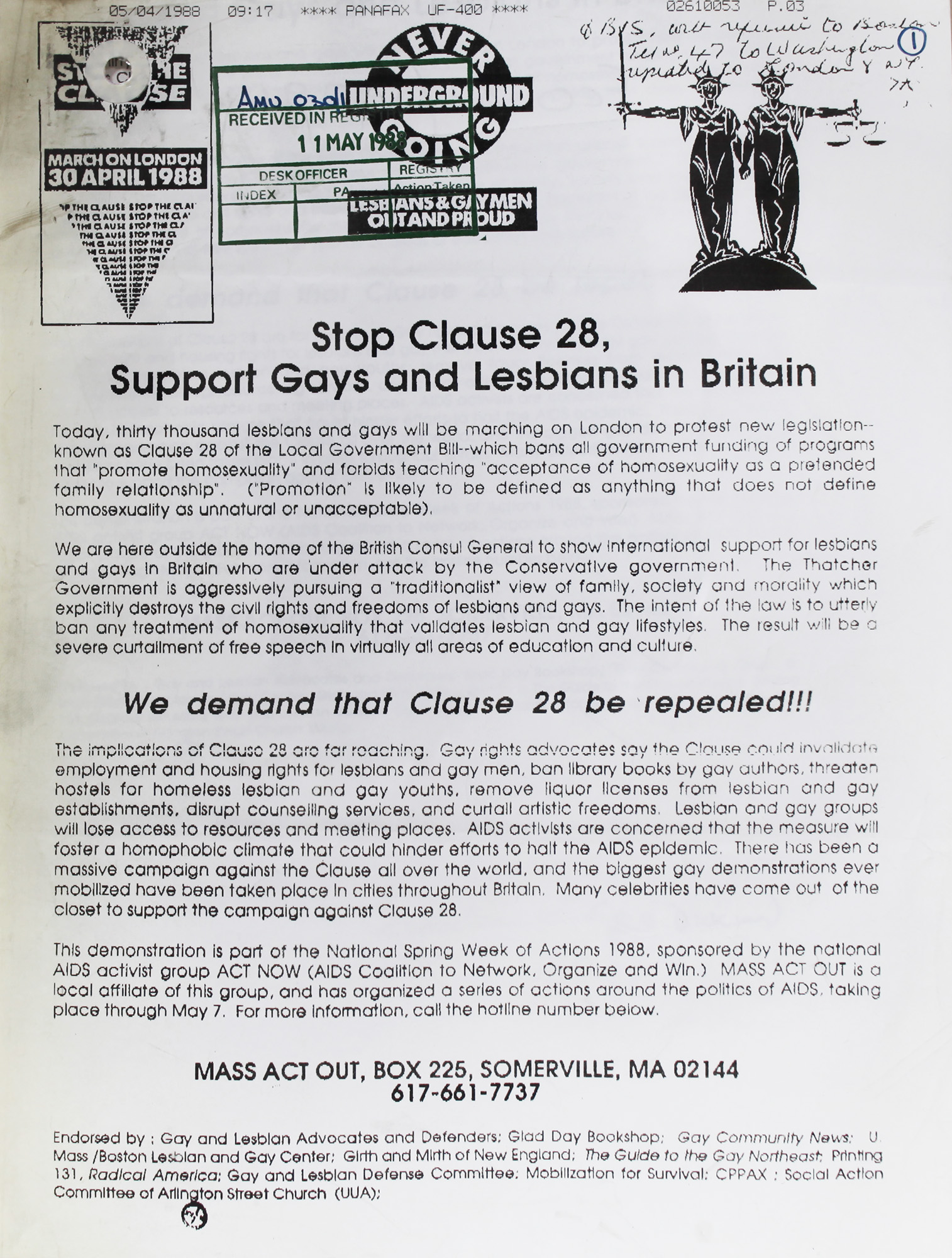
1988: Clause 28 protest leaflet. Catalogue ref: FCO 82/1979
Clause 28, or Section 28 of the Local Government Act, was a law introduced by Margaret Thatcher’s Conservative Government in 1988. It followed controversies about sex education and objections, mainly from Conservative MPs, about the championing of gay causes by Labour-led councils. LGBTQ+ people were becoming more confident and visible in the worlds of pop music, television and film, but there was still a great deal of prejudice present in the national discourse.
This law banned local authorities from ‘promoting homosexuality’. This meant for example that state schools and local councils could not teach about or discuss LGBTQ+-related topics.
Clause 28 was in place until 2003.
Transcript
NEVER GOING UNDERGROUND
LESBIANS & GAY MEN
OUT AND PROUD
Stop Clause 28, Supporting Gays and Lesbians in Britain
Today, thirty thousand lesbians and gays will be marching on London to protest new legislation – known as Clause 28 of the Local Government Bill – which bans all government funding of programs that “promote homosexuality” and forbids teaching “acceptance of homosexuality as a pretended family relationship.” (“Promotion” is likely to be defined as anything that does not define homosexuality as unnatural or unacceptable).
We are here outside the home of the British Consul General to show international support for lesbians and gays in Britain who are under attack by the Conservative government. The Thatcher Government is aggressively pursuing a “traditionalist” view of family, society, and morality which explicitly destroys the civil rights and freedoms of lesbians and gays. The intent of the law is to utterly ban any treatment of homosexuality that validates lesbian and gay lifestyles. The result will be a severe curtailment of free speech in virtually all areas of education and culture.
We demand that Clause 28 be repealed!!!
The implications of Clause 28 are far reaching. Gay rights advocates say the Clause could invalidate employment and housing rights for lesbians and gay men, ban library books by gay authors, threaten hostels for homeless lesbian and gay youths, remove liquor licenses from lesbian and gay establishments, disrupt counselling services, and curtail artistic freedoms. Lesbian and gay groups will lose access to resources and meeting places. AIDS activists are concerned that the measure will foster a homophobic climate that could hinder efforts to halt the AIDS epidemic. There has been a massive campaign against the Clause all over the world, and the biggest gay demonstrations ever mobilized have been taken place in cities throughout Britain. Many celebrities have come out of the closet to support the campaign against Clause 28.
This demonstration is part of the National Spring Week of Actions 1988, sponsored by the national AIDS activist group ACT NOW…
- Why has this leaflet been created?
- According to this leaflet, what are some of the effects that Clause 28 may have had?
- What tactics are they using to try and stop the law?
- Why do you think the government introduced this law? What might they have been hoping to achieve?
- Look at the date of this document in the top left corner. Why do you think the leaflet is connected to an AIDS activist group?
